Executive Summary
Voting for the 2024 European Parliament (EP) elections was held in France and Germany on 9 June 2024. In both countries, far-right and Euroskeptic parties saw major gains in parliamentary seats, with Germany’s Alternative für Deutschland (AfD) receiving 16 per cent of all votes in the country, while France’s Rassemblement National (RN) received a remarkable 31 per cent. This report investigates the tweets of high-profile RN and AfD accounts on X (formerly Twitter) in the two months directly before the EP election, and shines light on key similarities and differences between the two parties’ activities and rhetoric on the platform.
We found that the RN ran a cohesive and coordinated campaign on X, frequently posting about the upcoming election date and amplifying the voice of lead EP candidate Jordan Bardella. In contrast, AfD accounts were less consistent in their promotion of their message and campaign, often instead reposting from popular far-right English-language X accounts and using provocative language when engaging in arguments with users in the comments. Together, these findings reveal how increasingly tech-savvy far-right actors employ different approaches to campaigning on social media platforms, and show that their electoral success cannot be attributed to a one-size-fits-all strategy.
Findings
Different Tactics
- On average, the RN was more active on X, with a higher frequency of posts and retweets. RN accounts also had more than double the average number of followers than those of the AfD, indicating their messaging likely reached a larger audience. However, when AfD accounts did retweet or post, on average, they generated higher engagement.
- The most-engaged posts in the RN dataset were original tweets by the account authors referencing the EP elections, while the most engaged posts in the AfD dataset were retweets and responses to English-language accounts, including X’s owner Elon Musk, and content producers with handles such as “EndWokeness”, “DiedSuddenly”, and “HistoryMemes”. These posts did not reference the EP elections but, instead, featured anti-LGBT content, COVID-19 vaccination conspiracy theories, and promotional materials for the upcoming United States elections.
- Posts by RN accounts were more likely to mention and retweet the party’s leading EP candidate and repeat the election date of 9 June. RN accounts featured a consistency in profile backgrounds as well, with smiling images of Bardella and Marine Le Pen, in an effort to coordinate their image. AfD accounts instead exhibited a wider variety of profile backgrounds, and seldom reposted content from their lead candidate, Maximillian Krah.
- The AfD had a higher proportion of posts with negative sentiment than the RN. RN accounts were more likely to use positive or neutral language related to the upcoming elections, while the AfD had a higher frequency of posts with negative language, and was less likely to reference the actual election.
Familiar Messages
- Both parties posted often about migration and crime by migrants or those with migrant backgrounds. Posts tied incidents like fatal stabbings in Mannheim and in Châteauroux to their country’s immigration policies, expressing sympathy for the victims while vowing to take a harder stance against immigration. Other topics, such as criticism of EU economic policy and support for police, also featured in their messaging.
- The AfD also had several posts relating to the “Pfizergate” scandal and the 2021 COVID-19 vaccine rollout in the EU, indicating the party’s greater willingness to engage with vaccine skepticism topics.
- The rift between the RN and the AfD seemed to go relatively unaddressed by RN accounts, with almost no mention of the AfD by RN politicians in the dataset. Several AfD accounts expressed outrage at the RN’s decision, but these posts received little engagement.
Methodology
The data for this analysis was collected via the X API, and includes the posts of the two parties made between 9 April and 9 June 2024. The data collected includes original posts by party accounts, replies by those accounts in X threads, and the posts those accounts reposted (retweeted). In total, 17,159 posts were collected from 53 accounts – 30 from the RN and 23 from the AfD. These accounts include the official X accounts of each party, as well as those of party leaders and prominent EP candidates on the platform. EP candidates were selected from lists the AfD and RN released ahead of the elections ranking their top candidates.
The collected data was then analysed using quantitative and qualitative methods. Much of the quantitative analysis was performed using natural language processing (NLP) techniques to identify the overall sentiment (tone) of each party’s posts, their most frequently used adjectives and nouns, and the prominent topics in their posts. The topic modeling was done using BERTopic , which uses BERT embeddings to extract topics from large amounts of text data. The qualitative analysis was performed by comparing the most-engaged posts from each party during the observed timeframe.
Frequency and Engagement Analysis
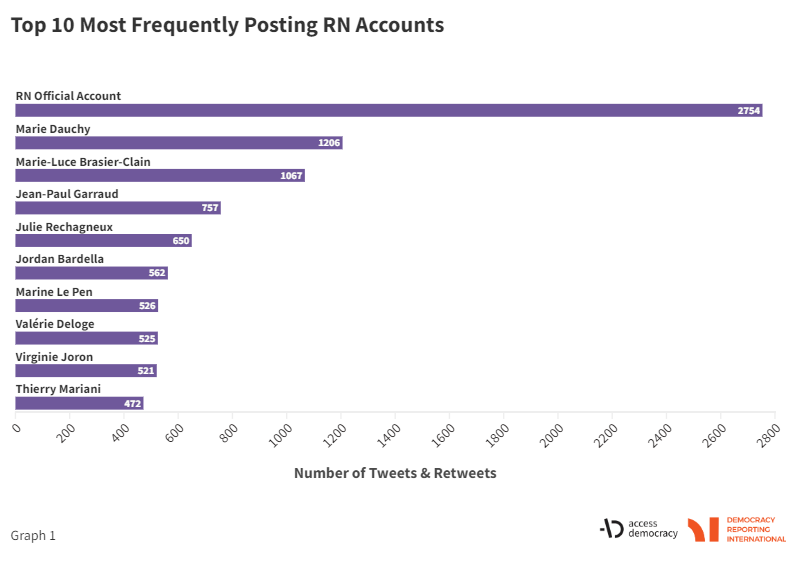
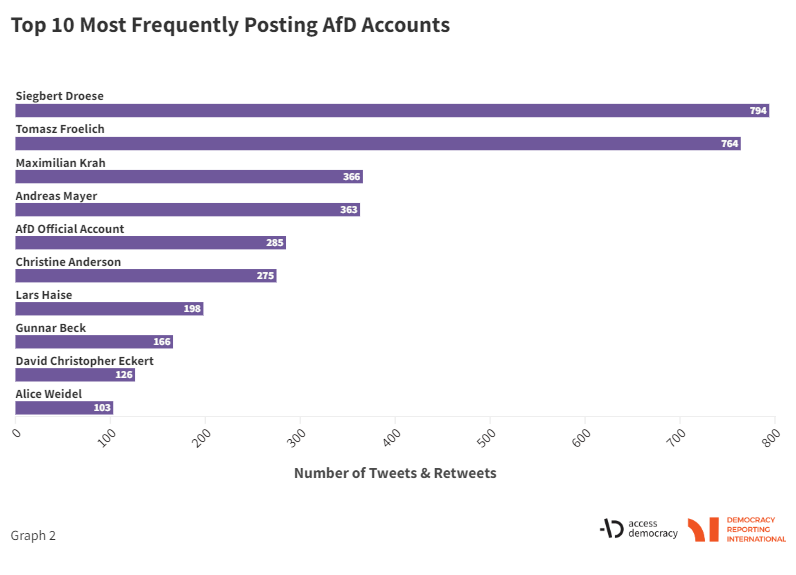
Graphs 1 and 2 show the top ten most frequently posting accounts from each party within the observed time frame. In the RN dataset, the official party account posted the most frequently, with 2,754 posts in the space of two months, many of which were retweets of posts by other RN accounts, whereas the AfD’s official account was the party’s fifth most frequently posting account, with only 285 posts and retweets within the same time frame. This discrepancy indicates that the RN relied more heavily on its official party account to spread the party’s messaging on X than did the AfD, where individual politicians took a more active presence on the platform. In the AfD, politicians Siegbert Droese and Tomasz Froelich posted at almost double the frequency of the then-lead EP candidate Maximilian Krah, and almost triple that of the official AfD account. These high rates were because Droese and Froelich frequently engaged with users in the comments of threads, by posting responses and rebuttals. For the RN, the top three accounts – the official RN account and those of Marie Dauchy and Marie-Luce Brasier-Clain – each posted more within the observed period than even the most active AfD account. Together, these findings show that the RN was the more active and engaged of the two parties.
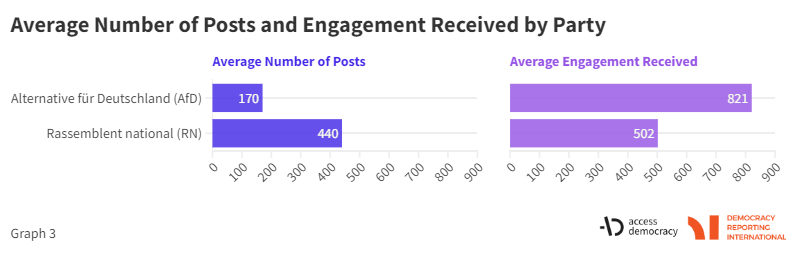
RN’s more active campaigning is further evidenced by the findings in graph 3, which shows that RN accounts in the dataset posted at a much higher average frequency than AfD accounts, with more than double the average number of posts per account in the observed time period (440 posts per account for the RN, compared to 170 for the AfD). Despite this, posts and retweets by AfD accounts generated much higher engagement on average (defined as the sum of retweets, quote tweets, likes, and comments) than those of RN accounts. The high average engagement the AfD generated is in part skewed, however, due to the retweeting of English-language accounts with large followings, such as Elon Musk’s official account. It should also be noted that the average RN account had more than double the number of followers than the average AfD account (141,861 and 57,478 average followers, respectively), suggesting that RN posts were likely viewed by more users, despite generating less average engagement.
Indeed, unlike the case with the RN, several of the most-engaged posts in the AfD dataset were retweets and replies to English-language accounts. The most popular post was a retweet and response to Elon Musk’s comment on a demonstration in Hamburg:
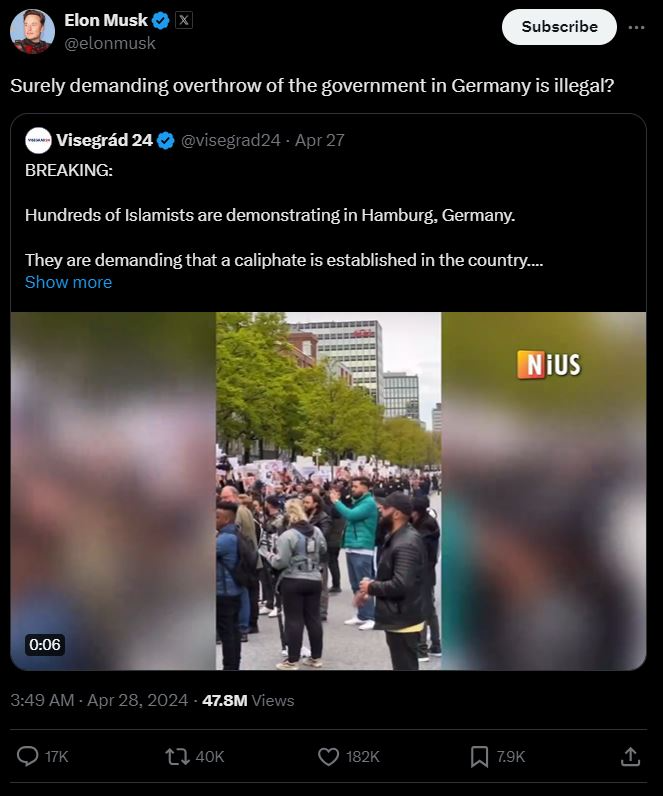
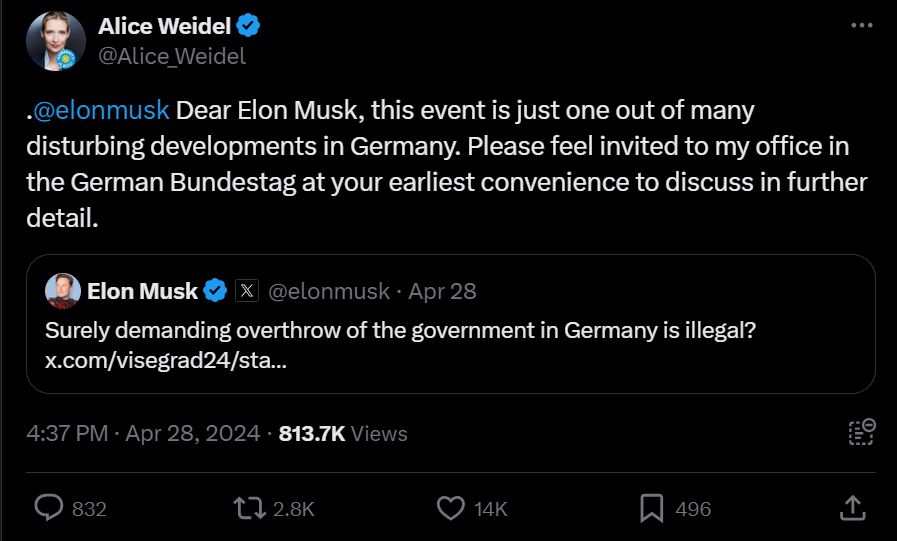
The above exchange is referencing a pro-Islamist rally in Hamburg in late April 2024.
These retweets often had little to do with the upcoming European elections but, instead, were on topics relating to the LGBT community, vaccine conspiracies, and perceived persecution of the far-right by the German government:

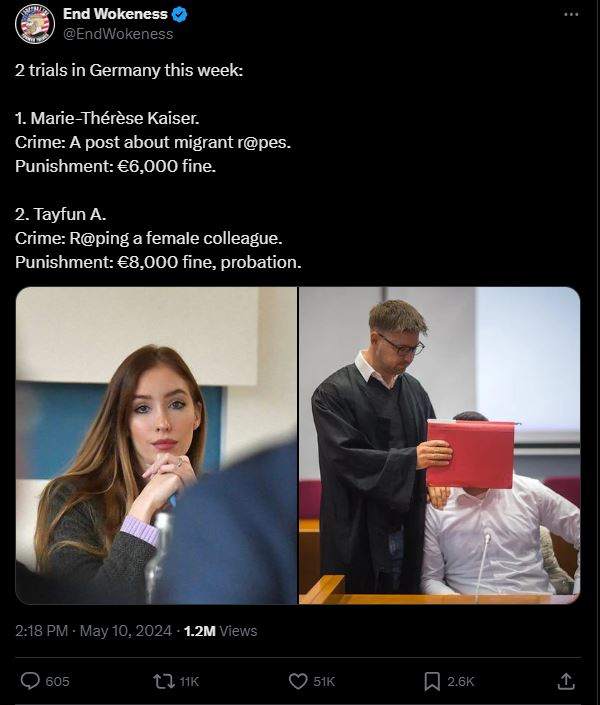
One of the accounts frequently retweeted, @DiedSuddenly, has over 700,000 followers and reposts content alleging that COVID-19 vaccines have resulted in the premature deaths of many people, and that this is being covered up. Another, @EndWokeness, enjoys over 2 million followers on X, and posts far-right content and tabloid headlines. In the above image, the account references AfD politician Marie-Therese Kaiser’s being fined for hate speech under article 130 of the German Criminal Code for “incitement to hatred”. She was not convicted.
In contrast, the posts in the RN dataset generating the greatest engagement were directly related to the elections, and were posted on election day:

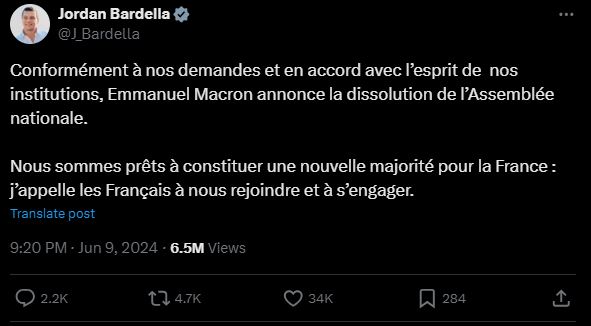
“When the people vote, the people win!” writes Marine Le Pen, while Jordan Bardella above declares that “in accordance with our requests and in accordance with the spirit of our institutions, Emmanuel Macron announces the dissolution of the National Assembly. We are ready to constitute a new majority for France: I call on the French to join us and get involved.”
The RN was also more likely to retweet, tag, or mention their frontrunning EP candidate than the AfD. Jordan Bardella’s handle appeared in 35 per cent of RN posts (4,674 total mentions), while Maximilian Krah appeared in just over 2 per cent of AfD posts (86 total mentions). This may be indicative of a concerted strategy by the RN to amplify Bardella’s messaging and image across X, where no such effort seems to have been made for Krah; here, however, we must account for the fact that, after his comments about the SS, the AfD asked him to stop campaigning.
Language Analysis
Further, we were interested in the language RN and AfD accounts used in their posts, as well as in the language of the posts they chose to retweet.
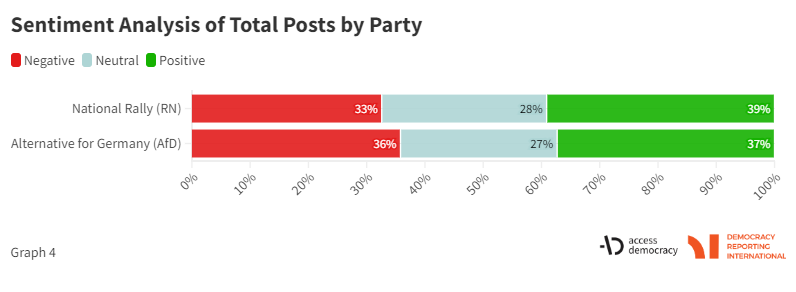
Graph 4 shows that a higher percentage of AfD posts had a negative sentiment score (36 per cent) than did RN posts (33 per cent), as well as a lower percentage of posts with a positive sentiment score (37 per cent and 39 per cent, respectively ). While these differences are small, they indicate that AfD accounts were more willing to employ negative language in their posts and express negative emotions like shock, outrage, and disgust. This difference can be further observed in the frequency analysis below of the most used adjectives in each dataset (graphs 5 and 6):
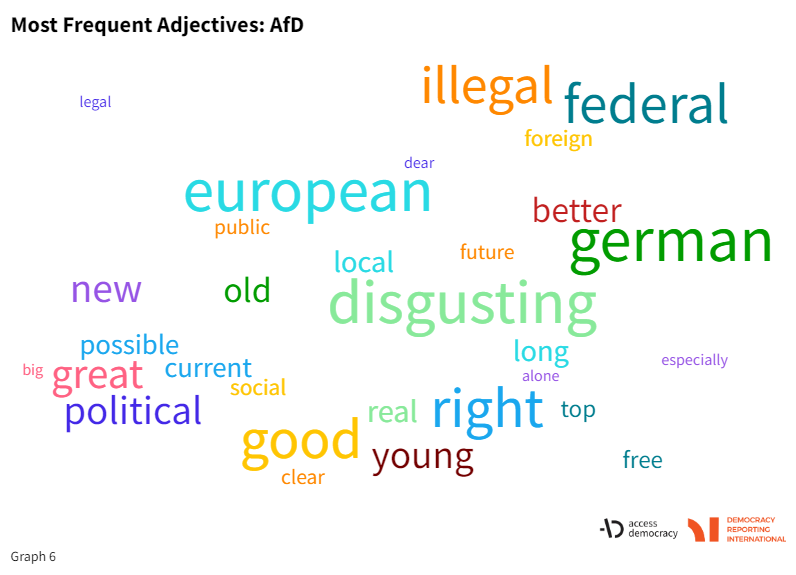
In the word clouds above, we observe the most frequently used adjectives in RN and AfD posts and retweets. Included are expected popular descriptors, such as “European”, “national”, “French”, and “German”. “Illegal” appeared heavily in both datasets – 99 times in the AfD set and 249 in the RN set. Most strikingly, however, the second-most common adjective in the AfD dataset was the word “disgusting” (widerlich), appearing 127 times. Qualitative analysis reveals this word was frequently applied to political opponents and the media, as well as to individual users responding to AfD accounts:
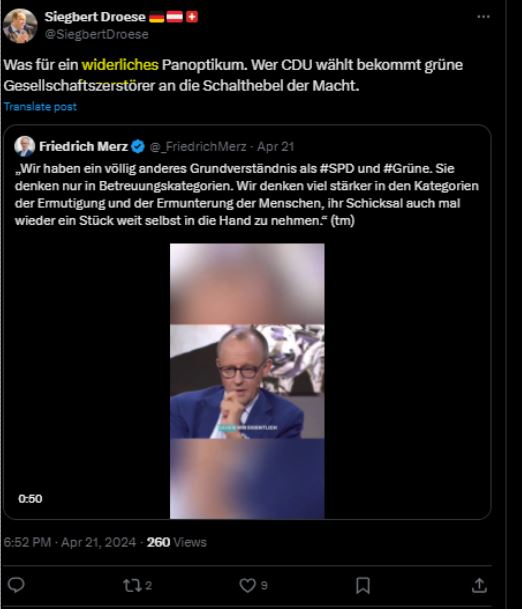
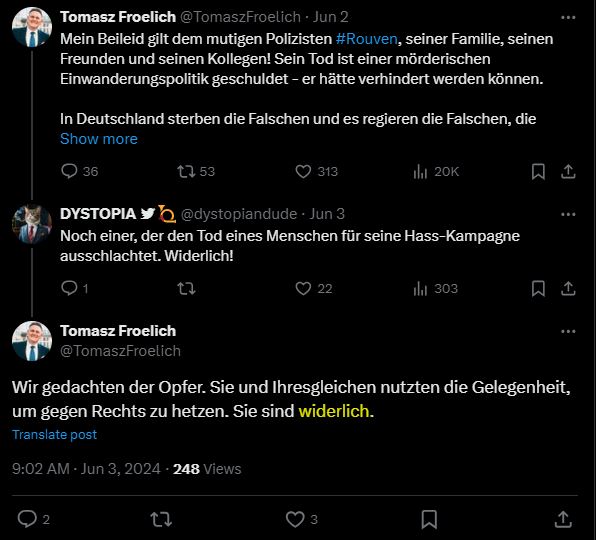
Above, right: AfD politician Siegbert Droese comments “What a disgusting panopticon. Whoever votes for the CDU gets green social destroyers at the controls of power.” Above left: AfD Politician Tomasz Froelich responds to a user accusing him of taking advantage of a murder for political purposes, saying “We remembered the victims. You and your kind used the opportunity to incite hatred against the far-right. You are disgusting.”
The comparative lack of negative and toxic language in RN posts may be explained by the party’s concerted effort to present a more respectable image in advance of the 2027 presidential elections.
Topic Analysis
We further examined the dominant topics in each party’s posts and retweets within the observed timeframe. Below, in graphs 7 and 8, are the five most-prominent topics identified during the analysis for each party, and the number of posts for each:
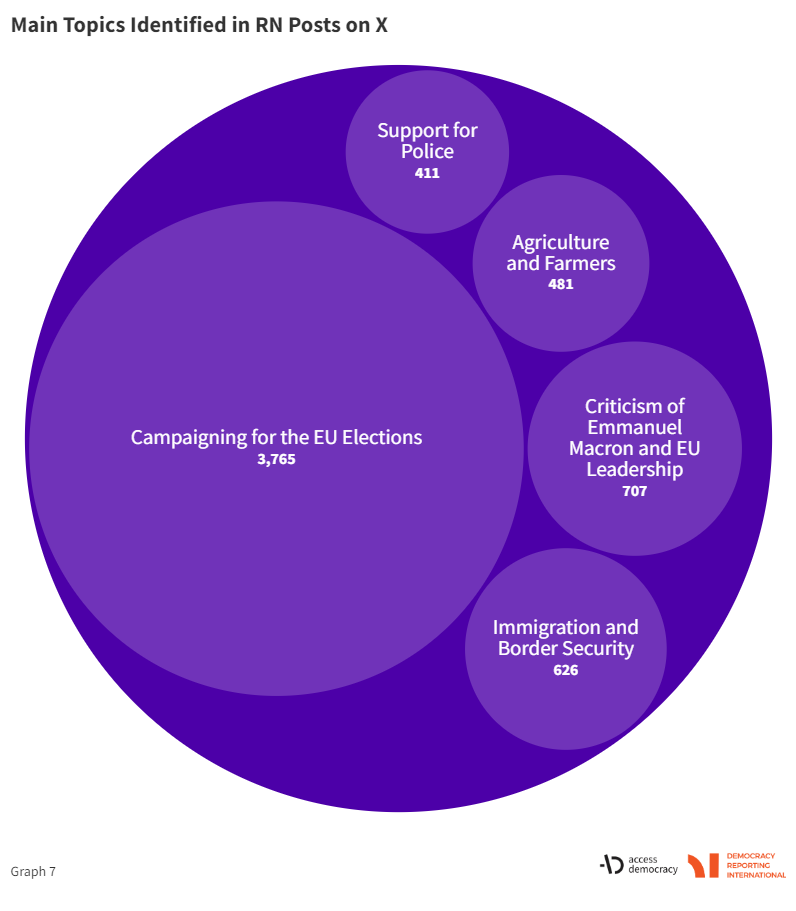
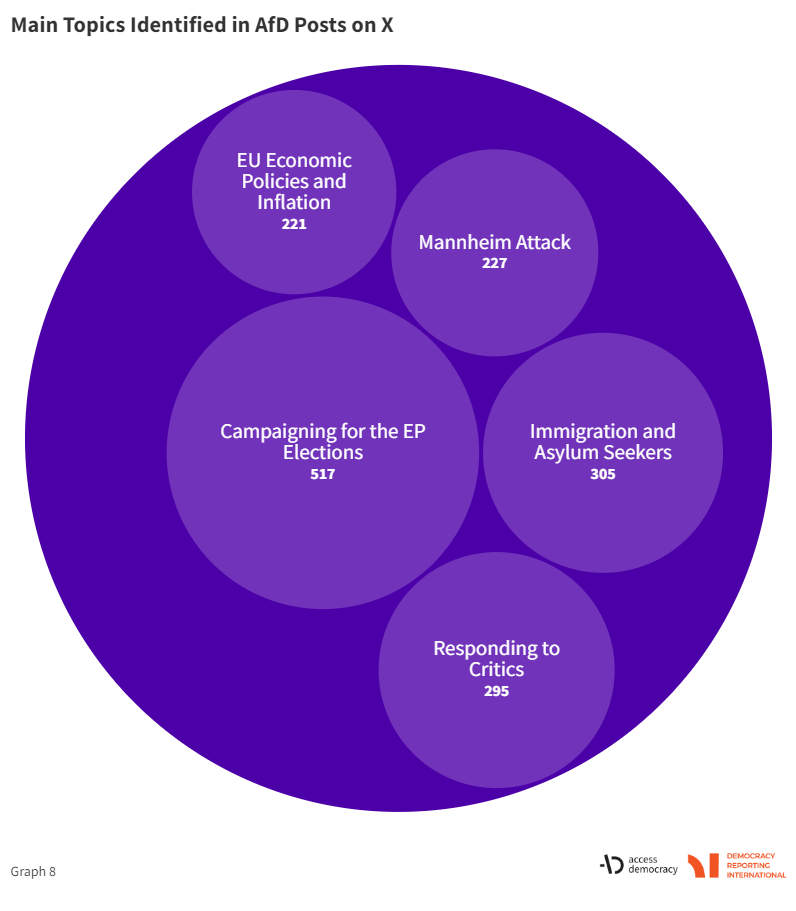
Content Similarities
There was much overlap in the types of topics the RN and AfD accounts chose to discuss or retweet during the campaigning period. In both parties, the dominant topic was that of campaigning for the EP elections, and encouraging followers to vote for their party on 9 June. The proportion of posts each party devoted to promoting themselves differed greatly, however, with 28 per cent of the total RN posts relating to the EP elections and campaigning, compared to only 13 per cent of the AfD posts.
Both parties posted frequently about immigration policies, asylum seekers, crime by migrants, and the need for stricter border security. The previously mentioned knife attack in Mannheim, where an attacker of Afghan nationality killed a police officer and injured five other people, was the fourth most-covered topic by AfD accounts during the period of analysis. Politicians expressed their condolences to the officer’s family and their support for police, while citing the incident as proof that stricter immigration policies are needed. Claims such as “#Mannheim is now everywhere in #Deutschland” and that “once again a person is being torn from our midst due to a completely failed asylum policy” tied the attack directly to the current German government.
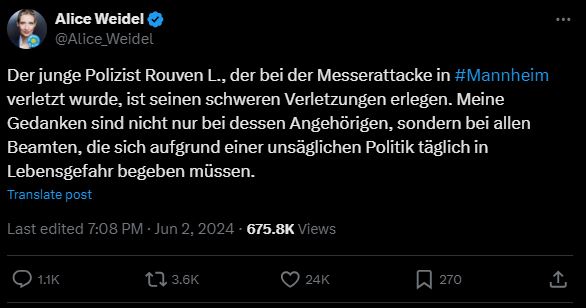
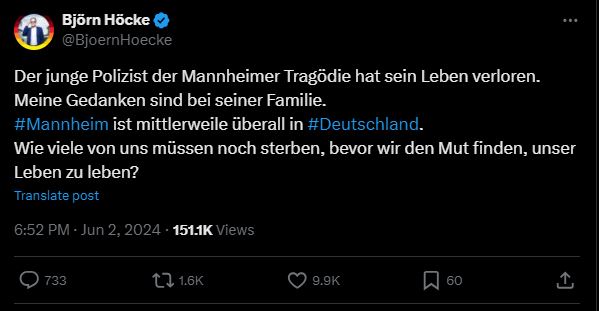
Above, left: AfD federal spokesperson Alice Weidel writes “The young police officer Rouven L., who was injured in the knife attack in #Mannheim , has succumbed to his serious injuries. My thoughts are not only with his family, but with all officers who have to put their lives in danger every day because of unspeakable policies.” Above, right: Björn Höcke writes “The young policeman in the Mannheim tragedy has lost his life. My thoughts are with his family. #Mannheim is now everywhere in #Deutschland . How many more of us have to die before we find the courage to live our lives?”
The RN responded in an almost identical fashion to the fatal stabbing of a 15-year-old boy in April, citing the Macron government’s migration policy as being responsible for the murder. The RN also made their support for police and law and order a large focus of their campaign, especially during the May riots in New Caledonia, which resulted in the deaths of several people, including police officers.


Above, left: Jordan Bardella writes “This is a new drama linked to our migration policy. The young Mathis, 15 years old, resident of Châteauroux, was killed with a knife by an Afghan minor, who had just been released by the courts. I feel immense pain for his family, and immense anger for our leaders.” Above, right: Matthieu Valet writes “His name was Nicolas, he was 22 years old, he was so proud to be a police officer 🇫🇷 . He signed up to serve the French at the age of 20. He had been thrown into the middle of the civil war in New Caledonia with his comrades from the Melun squadron. We are all in mourning 🙏 .”
Both parties also often expressed Euro-skeptic attitudes, particularly regarding the EU’s economic policies and close ties to their current ruling governments. Five per cent of AfD posts were related to inflation and blaming the EU for Germany’s slowing economy. RN accounts frequently tied the Macron government and the EU to bad fiscal policy (five per cent of all total posts) and damage to the country’s agriculture industry (three per cent of all total posts).
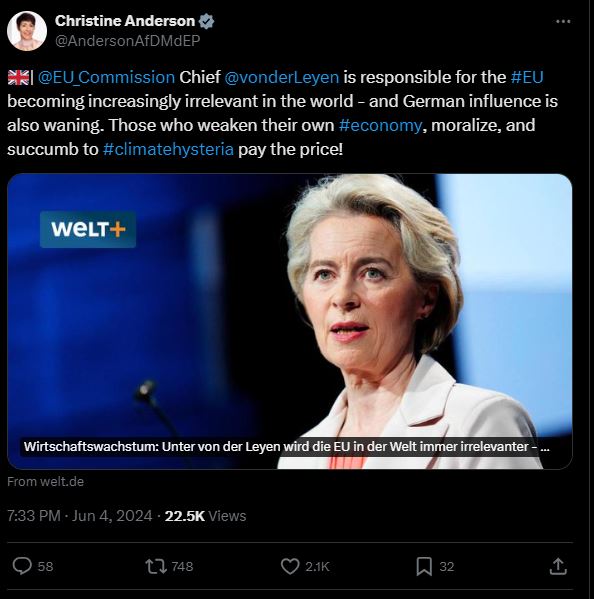

Above, left: A tweet by AfD politician Christine Anderson. Above, right: the official RN account writes “We oppose any European tax. The French do not have to foot the bill for others, just as they do not have to suffer more tax madness. To go into debt is to become poorer.” The image reads “To refuse any tax levied by the European Union, vote Bardella!”
Content Differences
#Pfizergate
AfD accounts were more likely to mention the investigations into European Commission President Ursula von der Leyen regarding her private communications with the CEO of Pfizer, and her role in the EU’s 2021 vaccine deal. Dubbed “Pfizergate”, this topic appeared 51 times in the AfD dataset, but only once in the RN dataset. AfD posts often spoke about this investigation in sensationalist terms, citing it as an example of the corruption of EU “elites”, and implying the 2021 rollout was corrupt.
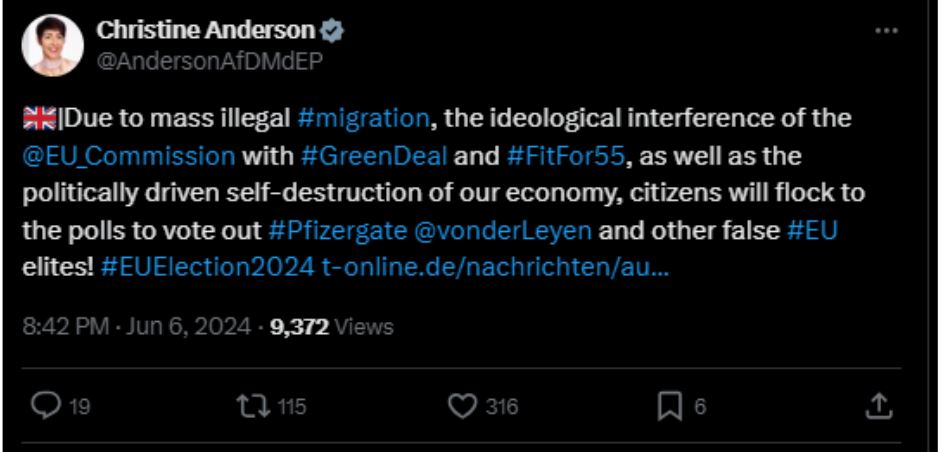
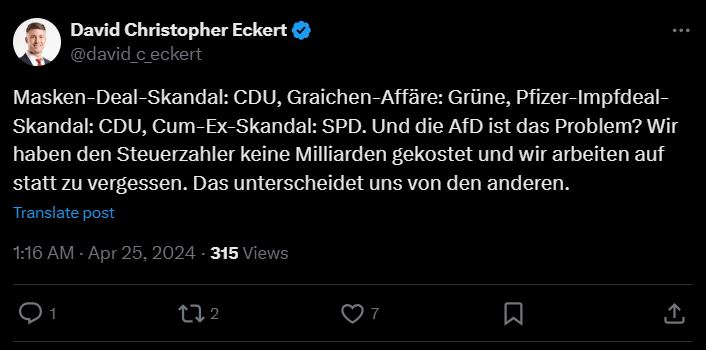
Top, right: David Christopher Eckert writes “Mask deal scandal: CDU, Graichen affair: Greens, Pfizer vaccination deal scandal: CDU, Cum-Ex scandal: SPD. And the AfD is the problem? We haven’t cost the taxpayer billions and we’re working on things instead of forgetting. That’s what sets us apart from the others.”
Responding to Critics
One of the most common topics identified in the AfD dataset can best be classified as “responding to critics”. AfD accounts, especially the most frequently posting accounts, often exhibited no qualms about engaging with users in the comment sections of posts. Sometimes, these exchanges were positive in nature, while other times they were scathing in tone. In most cases, these responses had little to do with the upcoming EU elections and generated little engagement.
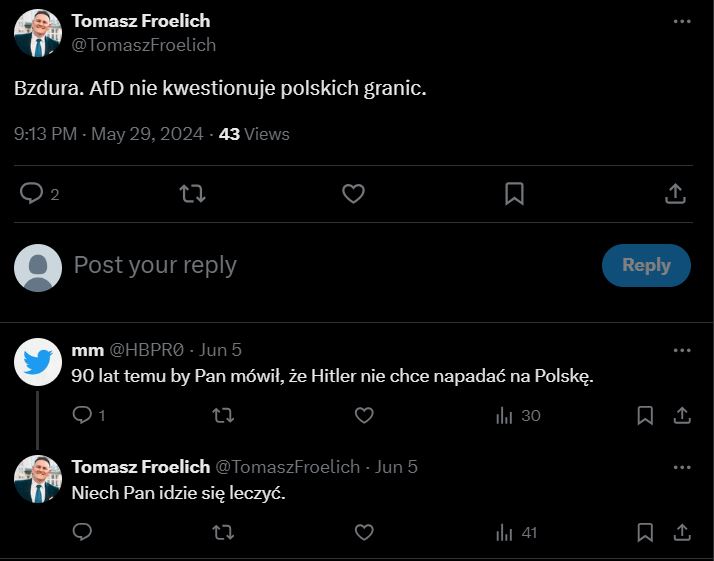
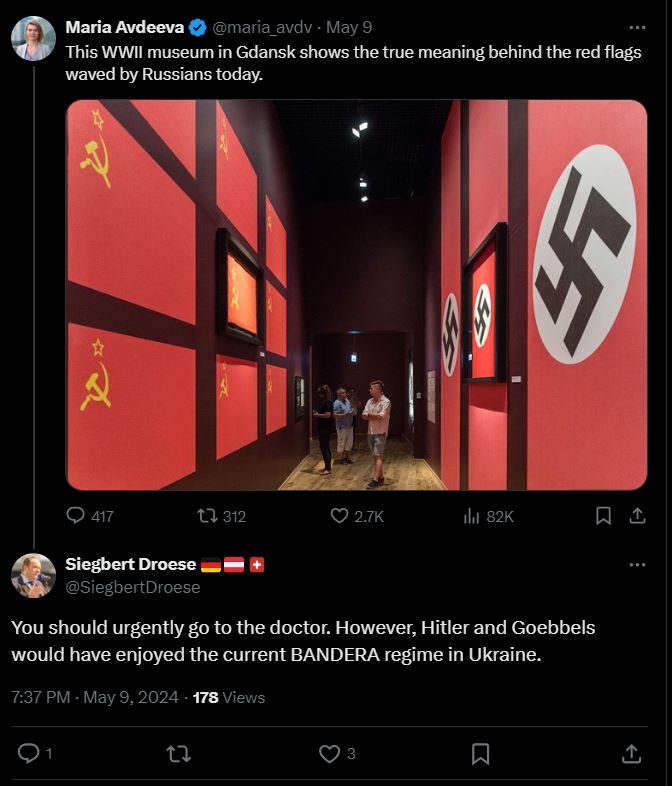
Above, left: Tomasz Froelich responds (in Polish) to a larger thread about German – Polish relations “Bullshit. The AfD does not question Poland’s borders.” A user replies that “90 years ago you would have said that Hitler did not want to attack Poland.” to which Froelich tells the user to “go get treatment”. Above, right: Siegbert Droese tells a user to “urgently go to the doctor”.
The RN – AfD Split
A final discrepancy between the two datasets was the number of mentions about the break between the two parties following AfD lead candidate Maximilian Krah’s comment that “not all SS members were criminals”. Krah had already been the subject of a national scandal, with his assistant being arrested under suspicion of spying for China. Following his comments about the SS, the RN officially severed ties with the AfD, and expelled them from the EU Parliament’s Identity and Democracy political group in May.
While several AfD politicians expressed their frustration at Marine Le Pen’s decision, the split was mentioned only once as a retweet in the RN dataset. AfD accounts posted or reposted messages of annoyance, accusing the RN of choosing to “capitulate to their enemies”, and claiming that the RN was “looking for a reason to break away from us”. Posts by AfD accounts relating to the break could only be found on the day of the decision (22 May), and even then generated very little engagement. Combined, these findings indicate that the RN-AfD split had very little impact on the election discourse on X, with both parties preferring to focus on their primary opponents rather than criticise the other.
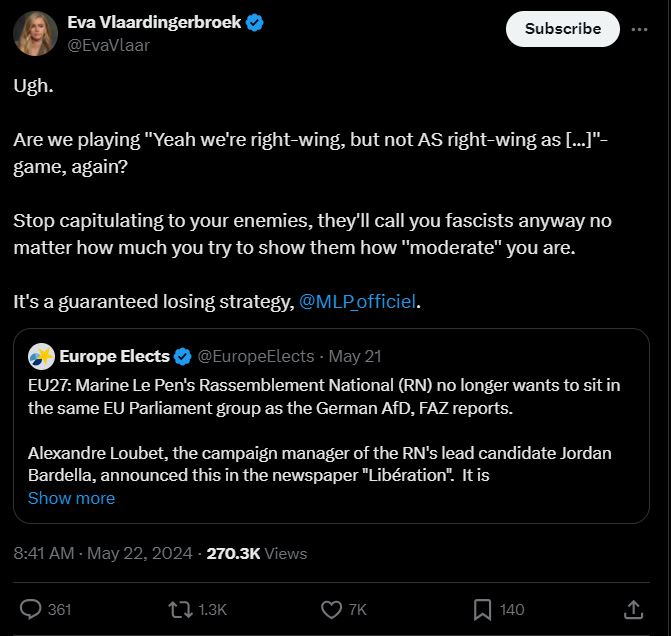
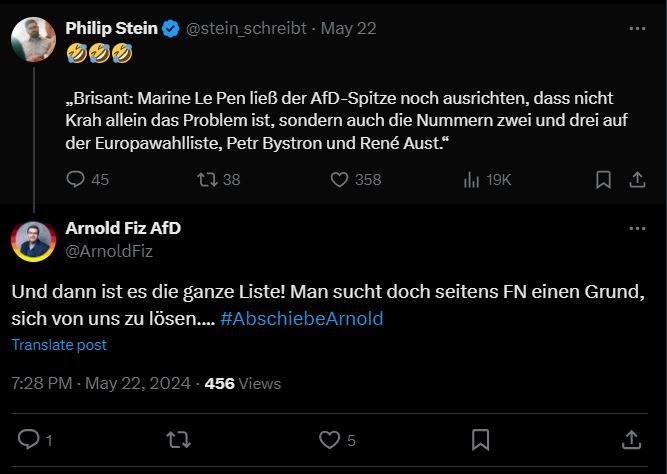
Above, left: Tomasz Froelich retweet’s a post by Dutch far-right political commentator Eva Vlaardingerbroek. Above, right: a user writes “Explosive: Marine Le Pen told the AfD leadership that it is not Krah alone who is the problem, but also numbers two and three on the European election list, Petr Bystron and René Aust.” To which Arnold Fiz replies “And then there’s the whole list! The RN is looking for a reason to break away from us….”
